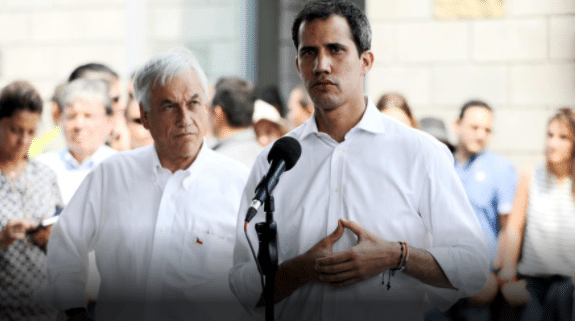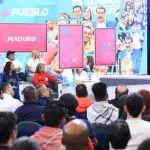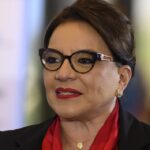
By HispanTV – Feb 18, 2022
Given the current rate of social change and the frequent apocalyptic signs, each year seems more intense than the last. But even so, 2019 was a special year for Latin America.
February 23 is a landmark in the history of the region: a number of governments conspired with the US to invade their neighboring country — Venezuela — by land, via the Colombian border, using the civil population as cannon fodder.
The fact that the whole event was a fiasco and that it made its organizers look ridiculous doesn’t take away from its significance: today relations between Colombia and Venezuela continue to suffer from its consequences, the Organization of American States lost the little relevance that it had, and the presidents of Chile, Sebastián Piñera, and of Colombia, Iván Duque, were buried, in political terms.
This tragic comedy was immediately preceded by the events of January 5, 2019, in Caracas, when Deputy Juan Guaidó, president of the National Assembly, declared that he would not recognize the victory of Nicolás Maduro in the presidential elections, and declared himself the self-proclaimed “interim president” of the country.
Guaidó was a small-time politician from the right-wing group Popular Will. His rise to fame was the direct result of the failure of 2017’s so-called insurrections in Venezuela, which forced the most significant coup plotters out of the picture, such as Freddy Guevara (who went to go live at the Chilean embassy).
But the joke of the self-proclamation, which in any other place would have provoked laughter and the immediate detention of the “president,” in Venezuela was taken rather seriously, because it was part of a bigger plan, which is still underway to this very day: the official recognition of Guaidó as president has been the legal pretext for the total blockade of the country and the looting of more than $30 billion worth of assets held outside of the country.
RELATED CONTENT: Washington Might be Abandoning Guaidó’s Project & Aiming at 2024 Presidential Race
As one of the main ideologues of the Lima Group, the government of former Chilean president Michelle Bachelet—today the high commissioner of human rights for the UN—was an active accomplice in the coup attempts in 2017 and in the blockade imposed on the Venezuelan people.
Today, thanks to the revelations of the Argentine journalist Horacio Verbitsky, it is also known that the Argentine government of former president Mauricio Macri, and of Brazilian President Jair Bolsanaro, were involved in 2019 in a plan to militarily invade Venezuela.
Sabotage, coups, and outbreaks
After the failure of the “humanitarian invasion” in February, by March 2019 they were already carrying out their Plan B: generate chaos in Venezuela by sabotaging the electrical grid, an action which left practically the whole country without power. But it didn’t work because people didn’t go out and loot and burn things down as the organizers had hoped.
On April 30 of that same year, a coup was underway in Caracas “before the sun had risen”: a group of military personal rebelled, and with Guaidó in the lead, they tried to occupy the La Carlota air base, in the heart of the Venezuelan capital, counting on receiving support from within the base, which didn’t happen.
The opposition leader Leopoldo López, then in house arrest under charges of inciting mass homicide, joined them, but the “coup” ended up being nothing more than the occupation of a bridge and a section of the highway which surrounds the military base, after the few participants abandoned the coup and revealed they had been mobilized through deceit.
That same year, in October, anti-neoliberal protests broke out in Chile which had the Piñera government against the ropes. The administration responded by violently repressing the protesters, causing more than 40 deaths. Over 400 people, mostly young people, were blinded in some way or suffered mutilations to their eyes, setting a world record which will haunt the worn-down Piñera to the end of his days.
In Bolivia, in November of the same year, the “non-violent” insurrection manual was used once again — successfully executed in Ukraine in 2014 with political and military support, and organized fascist gangs attacking officials and members of parliament, lighting their houses on fire, threatening them, intimidating their families and forcing them to resign their posts.
The coup attempts had the active backing of the OAS, and particularly that of the General Secretary Luis Almagro, who accused the Bolivian presidential elections of fraudulence, allegations which were based on the reports of the OAS electoral mission, the only body which supervised the elections.
Later, it was verified that the report and the charges were all part of the same coup-mongering plan, a plan which that same year Almagro tried to execute on the Caribbean island of Dominica, to block the re-election of Prime Minister Roosevelt Skerrit, an ally of Venezuela.
Copying the Bolivia playbook, Dominica was subjected to roadblocks and arson, in anticipation of the “fraud” that Skerrit’s Labor Party was going to commit.
But Skerrit was more astute than Evo Morales: he accepted the OAS electoral supervision, but he also invited a European Union mission, and others from the Caribbean community, the British Commonwealth, and others, which impeded the Bolivian-style fraud accusations.
Cúcuta
During the scandalous Cúcuta episode, the presidents Duque, Piñera, Mario Abdó (of Paraguay), plus Almagro (OAS) and Guaidó, dressed in guayabera shirts, made themselves cozy, happy, and smiling. They wanted to witness — in real time — the invasion of Venezuela and the fall of Maduro.
As the date drew nearer, numerous US military planes had arrived, carrying “humanitarian aid.” Piñera also traveled in a plane with boxes which he proudly delivered, together with his chancellor, the former Communist Roberto Ampuero, who today is hidden away as ambassador in the Chilean embassy of Madrid.
To make sure that there was sufficient cannon fodder, on the eve of the invasion the English businessman Richard Branson (Virgin founder) organized a a mega-concert “for peace” on the Venezuelan border, which saw the performances of the main Latin pop stars of the moment, who encouraged the crowd, with varying degrees of enthusiasm, to participate in the crusade planned for the following day.
They were hoping for 300,000 people, but it didn’t attract more than 20,000 or 30,000, and the next day the “mass” that was going to invade was hardly one thousand. This mob was mostly made up of those who were there to see if they could get their hands on something from the “aid” trucks, and those who were recruited as the riot squad from among Venezuela’s delinquent gangs.
As all of this was seen and filmed in person, these aren’t second-hand tales. We also saw and filmed the arson of three of the trucks on the border bridge of Santander, which Duque attributed to Maduro.
In addition, we saw and filmed the tenacious resistance of the small groups of unarmed police who contained the attacks on the bridges, supported by Chavistas who defended themselves with stones.
We were in Cúcuta observing the aerial military traffic and the emergency preparations made by hospitals and public services. We interviewed a public servant from the provincial government, who feared the possibility of a war which would plunge the region into misery, and into the clutches of paramilitary groups.
RELATED CONTENT: Leopoldo López and Guaidó Party in Crisis: 100 Party Members Quit
We saw and recorded human trafficking by paramilitary groups on both sides of the Táchira river, on the border. We saw and filmed large-scale contraband operations organized and greenlighted by the Colombian government.
We saw and filmed the astonishing total opening of the Colombian border on February 22, 2019, opened for Venezuelans who—after the “peace concert”—were supposed to be the vanguard of the operation that was aiming to culminate in the occupation of a beachhead which would permit foreign military intervention.
There was no invasion. Not a single shot was fired by Venezuela, and early in the day the defeat of the schemers was evident on the faces of the activists and the “dignitaries.”
In one of those fits of enthusiasm so characteristic of Piñera, he publicly offered Chile up as a destination for those seeking to leave Venezuela. At that time, emigration from Venezuela was actively being stimulated, by funding from the UN Refugee Agency, and other non-governmental organizations in Europe and the US.
Thanks to how easy Piñera was making it to move to Chile, Venezuelans living in Colombia, Ecuador and Peru, who had been mistreated and discriminated against, began to make their way to Chile, immigrating en masse. Today it has been calculated that more than 600,000 Venezuelans have made the trip.
Three years later, Piñera is at the end of his term, charged with corruption and human rights violations, a disgrace to his people and even to his own allies. The Colombian, Duque, is preparing himself for a loss in the upcoming elections, while Almagro and the OAS are no longer taken seriously by anyone.
In Bolivia, the people have recovered their sovereignty and chosen the masista Luis Arce (Evo Morales’ Minister of Economy) as president, who has restarted the push for multifaceted development, which has placed the region at the vanguard.
Everything seems to indicate that Brazil will once again be governed by Luiz Inacio da Silva Lula, following the social, economic, environmental, and medical disaster brought about by the fascist Bolsonaro. In Chile, a democratically elected convention, with a leftist majority rooted in social movements, is drafting a new constitution to replace the one in use since Pinochet’s dictatorship.
Of the almost 60 governments who recognized Guaidó in his day, there are only 16 left, and these do so solely for the purpose of looting Venezuela’s wealth. The Lima Group, for all it was worth, stopped existing because it lacked members.
The Venezuelan economy, as such, is rapidly recovering. It has begun producing and exporting petroleum again, while the country is strengthening its political, economic, and military relations with China, Russia, and Iran. Internally, the political situation was stabilized with the parliamentary and regional elections, which saw the active participation of the right-wing opposition.
Who could have imagined this, on the morning of February 23, 2019?
Featured image: Former deputy Juan Guaidó speaking at an event. Photo: HispanTV.
(HispanTV)
Translation: Orinoco Tribune
OT/KW/SL/JRE/EF
- kwjorinocohttps://orinocotribune.com/author/kwjogobonito/
- kwjorinocohttps://orinocotribune.com/author/kwjogobonito/
- kwjorinocohttps://orinocotribune.com/author/kwjogobonito/
- kwjorinocohttps://orinocotribune.com/author/kwjogobonito/
Share this:
- Click to share on Twitter (Opens in new window)
- Click to share on Facebook (Opens in new window)
- Click to share on LinkedIn (Opens in new window)
- Click to share on WhatsApp (Opens in new window)
- Click to share on Reddit (Opens in new window)
- Click to share on Telegram (Opens in new window)
- Click to email a link to a friend (Opens in new window)





